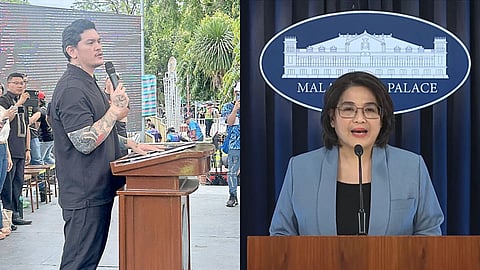
- NEWS
- the EDIT
- COMMENTARY
- BUSINESS
- LIFE
- SHOW
- ACTION
- GLOBAL GOALS
- SNAPS
- DYARYO TIRADA
- MORE

The Malacañang Palace has responded to Davao City Mayor Sebastian “Baste” Duterte’s remarks accusing President Ferdinand "Bongbong" Marcos Jr. of lacking a debt of gratitude toward the Duterte family.
The comments were made during the 88th Araw ng Dabaw celebration, which saw a massive turnout of protesters condemning the arrest of former President Rodrigo Duterte.
Presidential Communications Office (PCO) Undersecretary Claire Castro addressed the mayor’s criticisms, emphasizing that the Marcos family has long expressed their gratitude for the role Duterte played in allowing the burial of former President Ferdinand Marcos Sr. at the Libingan ng mga Bayani (LNMB) in 2016.
“As early as 2016, when President Marcos Jr. was still a senator, he already expressed his gratitude to the Supreme Court for its decision allowing his father’s burial at the LNMB. He also thanked former President Duterte for this act,” Castro said in a press briefing on Monday.
She stressed that the Marcos family had made it clear they would forever acknowledge Duterte’s gesture, but that gratitude should not interfere with the rule of law.
Speaking before a crowd that erupted into chants of “Marcos resign,” the younger Duterte accused Marcos Jr. of betrayal, recalling how his father had allowed Marcos Sr.’s burial at LNMB, only to now find himself in detention in The Hague, Netherlands.
“My father had your father buried, but my father you handed to his jailors,” he said, punctuating his statement with an expletive.
The Davao City mayor further declared that his family and their supporters would “stand up” and “fight back” against what they perceive as the illegal arrest of his father, arguing that the Marcos administration would never earn the loyalty of Duterte’s base.
Castro underscored that Duterte’s decision to allow Marcos Sr.’s burial at LNMB was not merely a personal favor, but a legal move aligned with Republic Act 289, which governs the burial of national figures at the Heroes’ Cemetery.
She further emphasized that legal commitments — including those related to international justice — should not be obstructed by personal loyalties.
“Debt of gratitude should not hinder the enforcement of the law. It should not be used as an excuse to defy legal obligations, including our commitment with Interpol,” she asserted.
